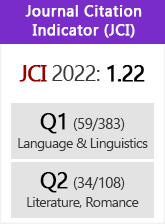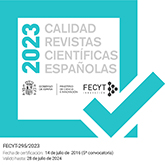Exclamativas y expletividad. El que enfático
DOI:
https://doi.org/10.3989/rfe.2004.v84.i2.108Keywords:
exclamative, expletivity, relative, completive, colloquial SpanishAbstract
This paper deals with the functional analysis of que when this word appears in sentences like ¡Qué buena novela que estoy leyendo!/Qué buena novela la que estoy leyendo!, ¡Qué cosa más rara que le ha pasado a Miguel!/¡Qué cosa más rara que le haya pasado a Miguel! Traditionally, two kinds of que have been well described: relative and completive; a third kind of que, typically expletive, is particularly interesting in exclamative sentences. We search what happens about negation, verbal mood and article in exclamative contexts, using literary and colloquial texts in Spanish. We treat two more aspects. First, if these sentences with expletive que can appear as embedded clauses. Secondly, we suggest that there is a common line between cleft exclamative sentences with es lo que and expletive sentences with que, according to distributional and semantical features.
Downloads
Download data is not yet available.
Downloads
Published
2004-12-30
How to Cite
Casas Plaza, A. (2004). Exclamativas y expletividad. El que enfático. Revista De Filología Española, 84(2), 265–284. https://doi.org/10.3989/rfe.2004.v84.i2.108
Issue
Section
Articles
License
Copyright (c) 2004 Consejo Superior de Investigaciones Científicas (CSIC)

This work is licensed under a Creative Commons Attribution 4.0 International License.
© CSIC. Manuscripts published in both the printed and online versions of this Journal are the property of Consejo Superior de Investigaciones Científicas, and quoting this source is a requirement for any partial or full reproduction.All contents of this electronic edition, except where otherwise noted, are distributed under a “Creative Commons Attribution 4.0 International” (CC BY 4.0) License. You may read here the basic information and the legal text of the license. The indication of the CC BY 4.0 License must be expressly stated in this way when necessary.
Self-archiving in repositories, personal webpages or similar, of any version other than the published by the Editor, is not allowed.














